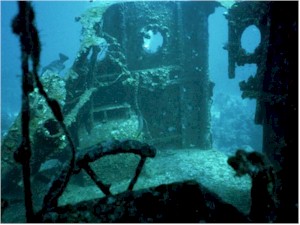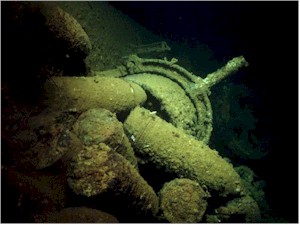Eco-Pros
Environmental Education on the Web
|
NEW METHODS FOR HELPING CREATE AND RESTORE CORAL REEFS
ARTIFICIAL REEFS - Some look at the placement of man-made objects in the ocean (on the seafloor, in the water column, or floating on the sea surface) as hard-surface opportunities for establishment of habitat for all sorts of plant and animal marine life to form highly complex community food chains. Others believe dumping junked items in the ocean is just an easy way to dispose of scrap material - a waste disposal activity under the umbrella of artificial reef construction.
Thousands of objects have been purposely sunk offshore in different areas of the ocean; in many cases primarily to enhance recreational opportunities for saltwater fishing and sport diving. These activities generate millions of dollars in revenue. Where environmental laws are in place (varying laws according to specific areas) these materials should be environmentally safe and not harmful to ocean species, they should be sunk in areas where they won't disturb already naturally-occurring habitat, they should not create hazards for navigation, or create the potential to trap divers or marine vertebrates. Proponents say that disposing of these items for this purpose saves landfill space, generates revenue from offshore fishing and diving, enhances fish stocks, reduces pressure on natural reefs by providing alternate areas for SCUBA diving and sport fishing, and it is a highly cost-effective way of getting rid of no-longer-useful objects. Others point out negative aspects in that some of those materials have rusted away, broken loose from storm and wave action, sunken into the sand, and many have leached and leaked harmful, toxic chemicals into the ocean waters.
Ocean Conservancy - Read their opinions on the pros and cons of artificial reefs. The Society for Ecological Restoration has honored Dr. Thomas J. Goreau and Wolf Hilbertz of the Global Coral Reef Alliance for their work in the use of solar panels to grow large limestone structures in the sea which facilitate the growth of corals and provide habitat for fish and other coral reef species. This method for restoring and creating new coral reefs is sustainable, environmentally safe, and economically and biologically feasible. Coral reefs are one of the most complex ecosystems. They are probably the most important marine ecosystems. They not only protect and nurture sea life, but also protect shorelines from destructive erosion. (Much more information can be found on the Global Coral Reef Alliance link on Reef Resources) |
||||
|
Guidelines for Marine Artificial Reef Materials (2nd Edition, January 2004) 205 pages in PDF format A Joint Publication of the Artificial Reef Subcommittees of the Atlantic and Gulf States Marine Fisheries Commissions to provide information related to the history, identification of the benefits, drawbacks, and limitations and guidelines on the use of selected materials for development of marine artificial reefs. The report has no legal standing, should be used for guidance only unless adopted by a regulatory agency. The report recommends that the information be given serious consideration in any decision-making process. Related photographs are included throughout the document. Background information discusses the generally-accepted definition of "habitat" related to the type of environment in which organisms normally live, and concludes that artificial reefs can be designated as "Essential Fish Habitat" under the definition provided by amendments to the Magnuson-Stevens Fishery Conservation and Management Act. Materials discussed for the development of marine and estuarine artificial reefs in the United States: Concrete; Steel Hulled Vessels; Oil and Gas Platforms; Aircraft; Railroad, Subway, and Street Cars; Designed Structures; Military Hardware; Natural Materials; Wood; Shell; Rock; Electrodeposition; Fiberglass, Ferro-cement, and Wooden Vessels; Fiberglass Boats and Boat Molds; Ferro-cement Vessels; Dry Docks; Wooden Vessels; Ash Byproducts; Solid Municipal Incineration Ash Byproduct; Coal Combustion Ash Byproduct; Oil Combustion Byproduct Ash; Vehicles; Vehicle Tires; White Goods (such as clothes washers and dryers, refrigerators); and Miscellaneous. These materials do not represent the full range of materials that could be used. The report and findings make for very interesting and informative reading, for those that have the time and interest.
Artificial Reefs
(Florida Oceanographic Society) Photos of Artificial Reefs (Florida Fish and Wildlife Conservation Commission) |

